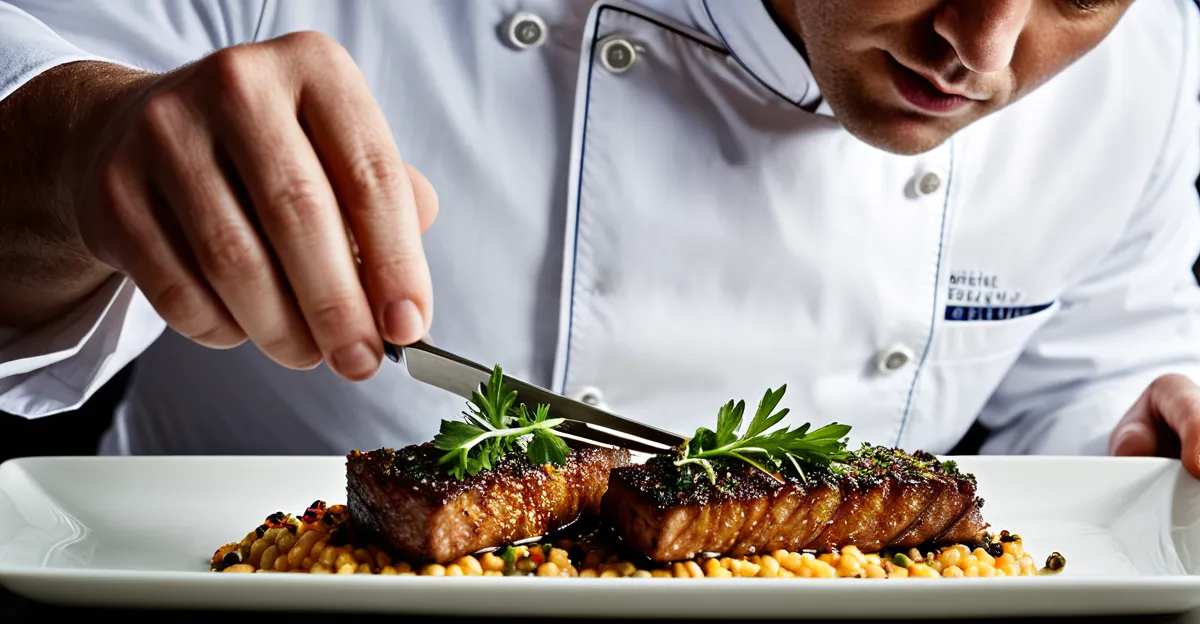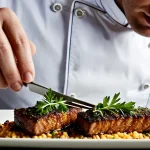Influence of British Chefs on Contemporary Global Cuisine
British chefs have significantly shaped modern culinary trends on the global stage. Figures like Gordon Ramsay and Heston Blumenthal have propelled British cuisine beyond traditional boundaries, showcasing innovative uses of local ingredients and advanced techniques. Their global visibility has fostered appreciation for British culinary creativity in diverse regions.
These chefs integrate classic British techniques with international flavors, enriching global cuisine. For example, the inventive use of molecular gastronomy by Blumenthal has inspired chefs worldwide to explore novel textures and presentations. Ramsay’s emphasis on precision and quality has raised standards in kitchens across continents, influencing how restaurants operate and deliver dining experiences.
Additional reading : Discover the trendiest color schemes transforming uk kitchens today
The impact extends to global dining standards and restaurant concepts. British chefs emphasize seasonality, sustainability, and storytelling through food, aligning with contemporary diners’ expectations. Their restaurants often blend tradition with innovation, encouraging a fusion approach that bridges culinary cultures. This approach helps elevate British food from simple fare to sophisticated art, reshaping dining norms worldwide.
Overall, British chefs act as ambassadors of modern culinary evolution, continuously inspiring peers and consumers to reimagine what global cuisine can represent. Their influence highlights the dynamic nature of the food industry today.
In parallel : Exploring the uk kitchen industry’s evolution amid emerging trends
Signature Contributions and Innovations by British Chefs
British culinary innovations have carved a unique niche in modern gastronomy, blending tradition with inventive techniques. Notable chefs like Heston Blumenthal and Jamie Oliver have redefined cuisine, introducing avant-garde ideas alongside accessible dishes. Blumenthal’s use of science in cooking exemplifies how technology enhances taste and presentation, making his restaurant a beacon of innovation.
Advancements in kitchen technology parallel these culinary leaps. Techniques such as sous-vide cooking and molecular gastronomy—pioneered and popularized by British chefs—demonstrate precise control over flavor and texture. This fusion has elevated British dining experiences, pushing boundaries beyond conventional expectations.
Signature restaurant concepts further highlight this trend. For instance, Noma-inspired pop-ups or farm-to-table establishments emphasize locally sourced ingredients, underscoring sustainability. Such concepts reflect an evolving food culture, blending heritage with modern innovation. This interplay also inspires emerging chefs within the UK and globally.
British chefs continue to shape gastronomy through both creative dishes and technological adoption. Their impact resonates in the culinary world, promoting experimentation without compromising quality or authenticity. These contributions serve as a foundation for ongoing culinary exploration.
Cross-Cultural Exchange and Fusion in British Chef-Led Cuisine
British food trends today embrace a vibrant cross-cultural cuisine scene, reflecting how chefs adopt and innovate with international ingredients and techniques. Fusion cooking takes centre stage, blending culinary traditions from diverse cultures to create dishes that surprise and delight. For example, the infusion of Asian spices with classic British staples like fish and chips reveals how fusion cooking reshapes expectations, offering bold new flavours while maintaining familiar comforts.
British chefs increasingly explore global culinary practices, incorporating methods like Japanese fermentation or Middle Eastern spice blends. This approach enriches the British food scene, allowing fusion cooking to flourish beyond simple ingredient swaps. It fosters creativity and broadens the palate of diners, reflecting a dynamic dialogue between cultures.
This cross-cultural cuisine evolution significantly impacts global perceptions of British food. Once seen as straightforward or traditional, British cuisine now shines as innovative and inclusive. Signature fusion dishes symbolize this transformation, positioning British chefs as pioneers in culinary creativity. The synergy of diverse influences not only revitalizes British food trends but also encourages a global culinary conversation, highlighting Britain as a melting pot of flavours and techniques.
Media and Popular Culture Amplifying British Culinary Impact
British culinary influence owes much to the media influence wielded by its celebrity chefs. Figures such as Gordon Ramsay and Jamie Oliver have transformed cooking from a daily chore into an engaging spectacle. Their presence on television and social media makes British cuisine accessible and appealing worldwide. The rise of cooking shows featuring these chefs showcases traditional and modern British recipes, inviting audiences to embrace the culture behind the food.
Popular cooking shows like MasterChef UK and The Great British Bake Off have achieved significant global reach. These programs highlight British culinary traditions while encouraging creativity and technique. Their success underscores how media influence extends beyond entertainment. They play a crucial role in shaping viewers’ perceptions about cooking and food culture.
This media phenomenon also impacts culinary education by inspiring aspiring chefs and home cooks alike. As celebrity chefs demonstrate their expertise on screen, they indirectly foster a culture of learning and appreciation. The combination of engaging content and practical skills encourages audiences to experiment with British cuisine, thus amplifying its global footprint. Media and popular culture continue to be vital drivers in promoting British culinary excellence.
Expert Insights and Industry Data on British Chefs’ Global Reach
British chefs have increasingly become influential figures on the global culinary stage. According to expert commentary from renowned gastronomy analysts, British culinary innovation blends tradition and modernity, allowing chefs to stand out internationally. This fusion, coupled with diverse cultural influences, solidifies the UK’s reputation as a culinary powerhouse.
Recent industry data reveals a significant presence of British restaurants worldwide, especially in major cities like New York, Dubai, and Tokyo. For example, the number of British-themed eateries has grown by over 30% in the last five years, demonstrating expanding demand for British cuisine abroad. This is not just limited to traditional fare—modern British chefs are embracing sustainability and local sourcing, appealing to contemporary tastes globally.
Regarding chef influence, British culinary professionals have secured numerous Michelin stars and prestigious awards, underscoring their international recognition. Awards like the World’s 50 Best Restaurants frequently feature British chefs, reflecting both skill and innovation. This success fosters greater opportunities for British chefs to inspire new culinary trends, reinforcing their global culinary footprint.


